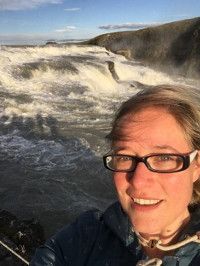Caroline - Radar specialist
Find out more about Caroline's role as a radar specialist
What’s your job title?
Radar Specialist. It basically means I look after all aspects of the operational life of our 15 Weather Radars and a bit of kit called a Radar Wind Profiler (we currently only have one of these on South Uist).
Why did you want to work at the Met Office?
I was always interested in Geography at school and Environmental Sciences but wasn’t sure what to do. I went travelling in Australia and on my return thought I’d like to keep travelling but get paid for it! So, I joined the Royal Navy as a Meteorologist/Oceanographer – this is where I learnt my trade. I was being trained as an assistant to the forecaster – briefing air crew, drawing charts etc, after being promoted from an observer. I also gained my foundation degree in Science via the Open University at this time – it was interesting keeping up with the tutor marked assessments while at sea! I then left the Royal Navy to start a family. I had loved my job so as soon as I was able I applied to join the Met Office in the Observations Operations section as this seemed quite fast paced and relevant, as close to the life I had before, and have never looked back! My entry into the Met Office is slightly different to others, as I do not have a university degree, but I had enough points from my foundation degree with the Open University to cover the criteria and be accepted for interview – I think my experience counted for a lot and I was offered the job.
What do you do day-to-day?
My day usually starts with checking on the radars individually – we have monitoring software which allows me to do some quick checks and see how they performed overnight, and I also talk to the Operational Meteorologists, who keep an eye on the equipment overnight and on weekends(they’re shift workers, so there are always Operational Meteorologists working 24/7 at the Met Office). Then it is checking my list of priorities – if there are no urgent incidents to deal with i.e. a broken radar! Next is scheduled/planned maintenance visits - the mechanics of the radars need regular upkeep and if any are due the equivalent of their MOT, that is what I try to organise first – liaising with our field service engineering teams across the UK to agree a timeline. Resource is tight so we try to book other contractors to visit at the same time (some of our sites are 3 hours away from a Field Service Centre so that’s a long round trip!) I also liaise with the Estates Management Teams to book generator maintenance, for example, at the same time or with Ofcom to get them to investigate any interference we are seeing at site to try to ensure the best quality data for our customers. So as you can see, I have to be really organised and enjoy talking to lots of different people.
What are the most exciting things you get to do?
Twice a year I meet my counterparts at other European National Meteorology Services in person to work together to improve the functionality of our Radar Networks and different operational work packages. These workshops are fantastic for driving forward improvements and for sharing ideas, personally I love working with these individuals and seeing how other organisations prioritise their Weather Radar Networks. My last trip was to Iceland and I was lucky enough to see the Northern Lights.
What do you love most about your job?
The satisfaction of seeing a problem or a drop in data quality and working with others towards a fix, my job involves a lot of liaison with other teams, inside and outside the office, and I really enjoy this.
Which skills did you have to develop and use to do your job?
Prioritisation, logistics, working well with others, organisation and prior planning is key – operations can be quite fast paced and you need to keep a clear head, regardless of what others feel the priority is, to ensure data quality and delivery in a timely fashion is achieved.
What does your job involve that people might not expect?
How versatile you need to be and happy with changes, all could be fairly calm with no scheduled maintenance due and you could be working on documentation, in a meeting, training, paying invoices or ensuring there is enough stock in Stores when an issue might arise and all else has to stop to focus on that and draw on my team around me and get it fixed!
What subjects did you enjoy at school?
A general background in Science helped my get my job, I personally love Geography and Environmental Science.
What are your hobbies?
I love reading, walking and science fiction – files or books!
What does the Met Office give you that you feel you couldn’t get elsewhere?
The Met Office is a really great place to work – I think quite modern and progressive in its way of thinking and working. I have been partially home working for nearly six years so I can live in my hometown of choice, over an hour’s drive from HQ, so my work life/balance is excellent. We are encouraged to complete training every year, so I am always engaged in my work and my future possibilities for my career. My Manager and Team are so supportive, I know this is possible elsewhere, but I have not found these benefits at any other job I have had.



